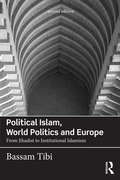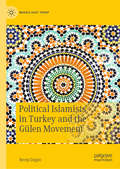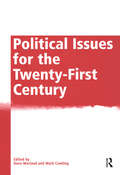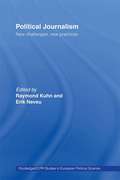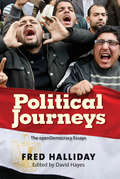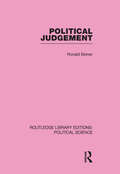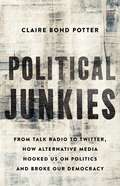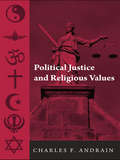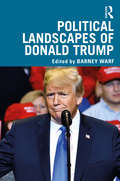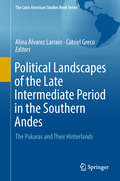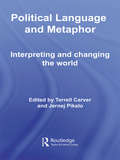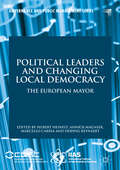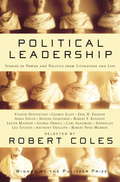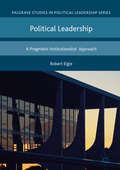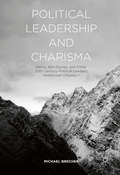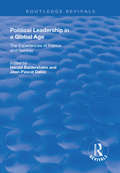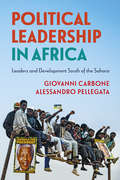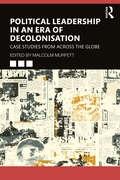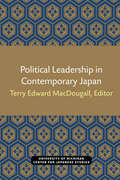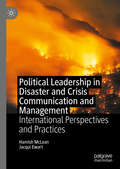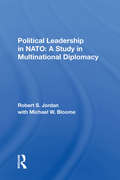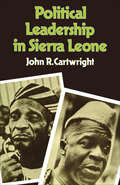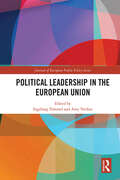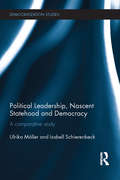- Table View
- List View
Political Islam, World Politics and Europe: From Jihadist to Institutional Islamism
by Bassam TibiThe new and updated edition of Political Islam, World Politics and Europe focusses on the shift within political Islam, in light of 9/11 and the events of the Arab Spring, from a jihadist struggle, to institutional Islamism. Refuting what has often been referred to by commentators as the ‘moderation,’ of Islamism, the second edition of this book introduces the concept of ‘institutional,’ Islamism, a process which Tibi argues was accelerated in the aftermath of the Arab Spring. Both jihadist and institutional Islamism pursue the same goal of an Islamist state, but disagree fundamentally on the strategy for achieving it. Whilst jihadism is committed to the idea of a (violent) Islamic world revolution, institutional Islamism embraces political institutions as a means to an end. Turning to the events of the Arab Spring in Tunisia, Libya and Egypt this book attempts to determine whether an abandonment of violence is enough to underpin a shift to genuine democracy. Analysing the fall of Morsi in particular, Tibi questions what lessons can be learnt from his presidency, and argues that this event will not change the overall trend of development from jihadism to institutional Islamism A timely addition to existing literature, this book will be of interest to students and scholars studying Middle Eastern and European Politics, Political Islam and International Relations.
Political Islamists in Turkey and the Gülen Movement (Middle East Today)
by Recep DoganThis book explores the struggle and differences between the current governmental power, the AKP, and the Gülen movement, the leading civic Islamic movement, in Turkey. It discusses the history of relations between the AKP and the Gülen movement and analyzes the reasons that caused tensions and, eventually, a radical rupture between them. In order to help readers to better understand the difference between Political Islam and civil Islam, the project explains the political theology of each group and compares them to each other. The author explains the human rights violations, restrictions on the media and the destruction of democratic institutions in Erdogan’s New Turkey project. This is an ideal monograph for scholars interested in the Middle East, sociology, and political Islam.
Political Issues for the Twenty-First Century
by Mark CowlingAssembling accessible and informative essays on contemporary debates and future issues in politics, this rewarding volume focuses on political developments in UK, European and international issues, and modern theoretical debates and problems. Each essay establishes the historical context before providing a speculative analysis of possible future developments. The collection presents a range of challenging and provocative accounts that deal with some of the most delicate, complex and fundamental issues that affect people living in Western Europe in the twenty-first century.
Political Journalism: New Challenges, New Practices (Routledge/ECPR Studies in European Political Science #Vol. 26)
by Raymond Kuhn Erik NeveuPolitical Journalism explores practices of political journalism, ranging from American 'civic journalism' to the press corps covering the European Union in Brussels, from Bangkok newsrooms to French and Italian scandal hunters. Challenging both the 'mediamalaise' thesis and the notion of the journalist as the faithful servant of democracy, it explores political journalism in the making and maps the opportunities and threats encountered by political journalism in the contemporary sphere.
Political Journalism in Comparative Perspective
by Erik Albæk Arjen van Dalen Nael Jebril Claes H. de Vreese Erik Albæk Arjen Van Dalen Nael Jebril Claes H. de VreesePolitical journalism is often under fire. Conventional wisdom and much scholarly research suggest that journalists are cynics and political pundits. Political news is void of substance and overly focused on strategy and persons. Citizens do not learn from the news, are politically cynical, and are dissatisfied with the media. This book challenges these assumptions, which are often based on single-country studies with limited empirical observations about the relation between news production, content, and journalism's effects. Based on interviews with journalists, a systematic content analysis of political news, and panel survey data in different countries, this book tests how different systems and media-politics relations condition the contents of political news. It shows how different content creates different effects, and demonstrates that under the right circumstances citizens learn from political news, do not become cynical, and are satisfied with political journalism.
Political Journeys
by David HayesOne of the great contrarians of international relations scholarship, Fred Halliday was able to combine his understanding of the broad sweep of modern history with a profound knowledge of modern revolutions, the Middle East, and national movements. This collection of Halliday’s political essays written for the online journalopenDemocracybetween 2004 and 2009 is proof of a subtle worldview that continues to generate questions: What is the relation between religion, nationalism, and progress? Is a new international order possible? When is intervention a force for progress? From the big headline topics such as the Iraq War to the unexpected comparisons of Tibet and Palestine, or Afghanistan and the Falklands, Halliday’s writings provide a perennially surprising and enlightened guide to the major issues of international politics.
Political Judgement (Routledge Library Editions: Political Science #20)
by Ronald BeinerOriginally published in 1983. One of the basic capacities of man as a political being is his faculty of judgement. Yet for all the books on concepts like freedom, equality and authority, surprisingly little attention has been given to this topic in the tradition of Western political thought. What is the nature of political judgement? What endows us, as human beings, with the ability to make reasonable judgements about human affairs and to judge the common world we share with others? By what means to we secure validity for our judgements? What are the underlying conditions of this human capacity, and what implications does it have the understanding of politics? These questions, central as they are to any reflection on politics have rarely been addressed in a systematic way. This book examines Kant’s concept of taste and Aristotle’s concept of prudence, as well as recent works of political philosophy by Arendt, Gadamer and Habermas, all crucially influenced by Kant and Aristotle.
Political Junkies: From Talk Radio to Twitter, How Alternative Media Hooked Us on Politics and Broke Our Democracy
by Claire Bond PotterA wide-ranging history of seventy years of change in political media, and how it transformed -- and fractured -- American politicsWith fake news on Facebook, trolls on Twitter, and viral outrage everywhere, it's easy to believe that the internet changed politics entirely. In Political Junkies, historian Claire Bond Potter shows otherwise, revealing the roots of today's dysfunction by situating online politics in a longer history of alternative political media. From independent newsletters in the 1950s to talk radio in the 1970s to cable television in the 1980s, pioneers on the left and right developed alternative media outlets that made politics more popular, and ultimately, more partisan. When campaign operatives took up e-mail, blogging, and social media, they only supercharged these trends. At a time when political engagement has never been greater and trust has never been lower, Political Junkies is essential reading for understanding how we got here.
Political Justice and Religious Values (Sociology Re-Wired)
by Charles AndrainWhy do individuals and groups hold distinctive theological views? Why do these beliefs change? In what ways do theological interpretations influence concepts of spiritual and political justice? How and why do these concepts of justice affect policy preferences held by religious liberals and conservatives? Much has recently been written about the relationship between power, conservative politics, and evangelical religious groups, but very little attention has been paid to so-called "progressive" religious groups among Protestants, Catholics, and Jews and their relationship to political thought and action. This wide-ranging and interdisciplinary work, ideal for use in college courses on religion and social issues, explores the impact of theological interpretations about God, the individual, society, church, and government on attitudes toward procedural and distributive justice. Major issues revolve around civil liberties, sexual choice, gender equality, world peace, prison reform, and income distribution
Political Landscapes of Donald Trump
by Barney WarfThis book delves into the life and work of President Donald Trump, who is arguably the most famous and controversial person in the world today. While his administration has received enormous attention, few have studied the spatial dimensions of his policies. Political Landscapes of Donald Trump explores the geographies of Trump from multiple conceptual standpoints. It contextualizes Donald and his rise to power within the geography of his victory in 2016. Several essays in the book are concerned with his white ethno-nationalist political platform and social bases of support. Others focus on Trump’s use of Twitter, his ties to professional wrestling, and his innumerable lies and deceits. Yet another set delves into the geopolitics of his foreign policies, notably in Cuba, Korea, the Middle East, and China. Finally, it covers how his administration has addressed – or failed to address – climate change and its treatment of undocumented immigrants. This book will be of interest to anyone interested in the Trump administration, as well as social scientists and the informed lay public.
Political Landscapes of the Late Intermediate Period in the Southern Andes: The Pukaras And Their Hinterlands (The Latin American Studies Book Series)
by Alina Álvarez Larrain Catriel GrecoThis book studies the relationship between pukaras and their surrounding landscape, focusing on the architectural and settlement variability registered in both contexts. It is the outcome of a symposium held at the XIX National Congress of Argentine Archaeology (San Miguel de Tucuman, August 8–12, 2016) entitled, "Pukaras, strategic settlements and dispersed settlements: Political landscapes of the Late Intermediate Period in the Southern Andes." Based on the topics discussed at the event, this book presents nine case studies covering a large geographic area within the Southern Andes (northwestern Argentina, northern Chile and southern Bolivia), and breaking the national barriers that tend to atomize pre-Hispanic landscapes.The respective chapters cover a wide range of themes: from architectural and settlement variability, ways to build and inhabit space, social segmentation and hierarchy; to endemic conflict, analysis of accessibility and visibility, spatiality and temporality of landscapes; as well as new dating. This book goes beyond the Late Intermediate Period (LIP) analyses from the perspective of fortified settlements and material evidence related to war, by placing the focus on how ancient political landscapes were constructed from the relation between the pukaras and other sites as part of the same territory.The methodologies used include pedestrian surveys, photogrammetric surveys with UAVs (unmanned aerial vehicles) or drones, topographic and architectural surveys, excavations of households, ceramic and rock art analysis, and spatial analysis with geographic information systems (GISs). Given the numerous thematic interconnections between the contributions, the Editors have organized the chapters geographically, moving from south to north: from the southern valleys of Catamarca Province in Argentina to Lipez in the southern part of the Bolivian Altiplano, passing through the Calchaqui valleys of Catamarca, the puna and Quebrada de Humahuaca of Jujuy in northwest Argentina and the Antofagasta region in northern Chile.The book provides valuable new theoretical and methodological perspectives on the study of political landscapes of the Late Intermediate Period in the Southern Andes .
Political Language and Metaphor: Interpreting and changing the world (Routledge Innovations in Political Theory #Vol. 30)
by Terrell Carver Jernej PikaloUntil a century ago, a metaphor was just a mere figure of speech, but since the development of discourse analysis a metaphor has become more than merely incidental to the content of the arguments or findings. Students and scholars in political studies know the importance of metaphors in electoral and policy-related politics, coming across metaphors that are, knowingly or unknowingly, influencing our perception of politics. This book is the first to develop new methodological approaches to understand and analyse the use of metaphor in political science and international relations. It does this by: Combining theory with case studies in order to advance substantive work in politics and international relations that focuses on metaphor Expands the range of empirical case studies that employ this category descriptively and also in explanatory logic Advances research that investigates the role of metaphor in empirical and discourse-based methodologies, thus building on results from other disciplines, notably linguistics and hermeneutic philosophy. This innovative study will be of interest to students and researchers of politics, international relations and communication studies.
Political Leaders and Changing Local Democracy
by Hubert Heinelt Annick Magnier Marcello Cabria Herwig ReynaertThis book studies political leadership at the local level, based on data from a survey of the mayors of cities of more than 10,000 inhabitants in 29 European countries carried out between 2014 and 2016. The book compares these results with those of a similar survey conducted ten years ago. From this comparative perspective, the book examines how to become a mayor in Europe today, the attitudes of these politicians towards administrative and territorial reforms, their notions of democracy, their political priorities, whether or not party politicization plays a role at the municipal level, and how mayors interact with other actors in the local political arena. This study addresses students, academics and practitioners concerned at different levels with the functioning and reforms of the municipal level of local government.
Political Leadership: Stories of Power and Politics from Literature and Life
by Robert ColesFrom ancient times to the present day, here are indispensable insights on political power and leadership as expressed in the novels, plays, and poetry of the world's greatest artists and intellectuals. Adapted from a course taught at Harvard by Pulitzer Prize--winning author Robert Coles, Political Leadership features scenes, stories, and speeches that pierce to the core of how and why some lead and others follow. In Felix Holt, the Radical, George Eliot observes that progressive reformers can be even more self-serving than their conservative counterparts; in The Prime Minister, Anthony Trollope suggests that honest men must cope with the corruption of politics-or leave leadership entirely to the crooked; and the works of Nadine Gordimer and George Orwell reveal that those who overturn tyrants often envy their power and repeat their mistakes. Anyone trying to understand today's confused and violent world will be both challenged and inspired by this unique and important collection. From the Trade Paperback edition.
Political Leadership
by Robert Elgie[A] compelling case for the institutional analysis of political leadership. . . you must buy and read this book. ' - R. A. W. Rhodes, Public Administration '[A] valuable contribution not only to the study of political leadership, but also to the study of comparative politics. ' - Valerie Mort, Talking Politics Concentrating on the period since 1945, Political Leadership in Liberal Democracies examines the resources of and constraints on political leaders in contemporary political systems. The book compares six countries to assess the effectiveness of political leadership and its relationship to the nature of institutional structures and political environments. The author argues that while the leadership environment has become more constraining and difficult in recent years, the potential for effective leadership in liberal democracies has not been extinguished.
Political Leadership and Charisma
by Michael BrecherThis book is unique in illuminating and comparing the charismatic role of two political leaders, Jawaharlal Nehru and David Ben-Gurion, along with assessments of many other 20th century political leaders. Its aim is to enrich our knowledge of an important dimension of global politics: charismatic leadership. The central role of political leaders in shaping the behavior of states has been universally recognized since the political systems of antiquity in East Asia, the Middle East, and Europe. With the massive increase of independent states since the end of World War II, from 55 initial members of the United Nations to more than 200 today, and especially the emergence of awesome weapons of mass destruction, the centrality of political leaders in the survival of the planet has grown exponentially. Both India and Israel have experienced the crucial role of charismatic leaders, Nehru and Ben Gurion, who dominated their states and societies for a near-identical formative period in their political independence, 1947-64 and 1948-63 respectively, as charismatic leaders. Their impact, Brecher shows, extended far beyond their states to both their geographic regions and global politics.
Political Leadership in a Global Age: The Experiences of France and Norway (Routledge Revivals)
by Jean-Pascal DalozTitle first published in 2003. Responses to globalisation in politics and governance at national, regional and local levels of government in France and Norway are explored in this engaging study.
Political Leadership in Africa: Leaders and Development South of the Sahara
by Giovanni Carbone Alessandro PellegataDo political leaders matter for development in Africa? Political leaders south of the Sahara have taken centre stage since countries in the region gained independence in the 1960s, yet a 'leadership trap' soon emerged with power-holders overstaying in office and chronic instability caused by coups resulting in decades of disappointing developmental performances. The beginnings of change are found in political reforms of the early 1990s, with many sub-Saharan countries introducing multiparty elections and an increasingly regular succession of leaders. But what impact did the new mechanisms for selecting leaders have on the political stabilization of African states, on the growth of their economies, and on the welfare of ordinary citizens? Drawing on a new dataset called the Africa Leadership Change (ALC), this innovative analysis of political leadership in Africa investigates the distinct leadership dynamics of development processes across the region from 1960 to 2018, revealing how, as Africa began to change its leaders and the way they reach power, these new leaders themselves began to change Africa.
Political Leadership in an Era of Decolonisation: Case Studies from Across the Globe
by Malcolm MurfettWhat is leadership, and why is it so important? In what ways does it look very different in different contexts, and in what ways does it look the same? Malcolm Murfett brings together a range of emerging and established scholars to examine these questions in light of some of the mid-twentieth century’s most intriguing national leaders. In a series of striking biographical chapters, lessons are drawn from the apartheid era in South Africa, Lee’s remarkable socio-economic transformation of Singapore, Castro’s revolutionary overhauling of Cuba, and the playing out of Bandaranaike’s populist agenda in Sri Lanka. The book illuminates what Brezhnev and Nixon were looking for in the Cold War and what happened when the people turned against Nyerere in Tanzania, the Shah in Iran, and Ceauşescu in Romania. These case studies address what leadership meant for the individuals whose record in power is being examined. These are not idealised portraits of ‘how to do leadership’ but warts-and-all portrayals of exceptional individuals who scrabbled their way to the top and stayed there for several years during a period of great change. Business schools have long studied the theoretical axioms of corporate leadership. What this book does, however, is to move beyond the theory into the practical realm of politics and statecraft. This is a fascinating book on leadership that will be of interest for students, researchers, and practitioners studying leadership in business and politics, as well as for students of global history, decolonisation, and the Cold War.
Political Leadership in Contemporary Japan (Michigan Papers in Japanese Studies #1)
by Terry Edward MacDougallPolitical Leadership in Contemporary Japan
Political Leadership in Disaster and Crisis Communication and Management: International Perspectives and Practices
by Hamish McLean Jacqui EwartThis book explores the role of elected leaders in disaster management. Filling a significant gap in disaster literature, the authors take a pragmatic approach to the relationships between the public under threat, the operational response, and the interests and actions of elected officials. Key tactics are explored, from the ways operational managers strategically deal with unreasonable political demands to what disaster officials argue is the responsibility of elected officials at all levels of government – that is, to ensure vital life-saving information reaches the people who need it most. The book draws on case studies such as the mismanagement of public perceptions by President George W. Bush during Hurricane Katrina in the United States and the widely acclaimed, heartfelt messages delivered by Queensland Premier Anna Bligh during the 2010–11 South-East Queensland floods in Australia. Drawing on a series of interviews with senior disaster managers in ten countries, this book is highly relevant for students, scholars and practitioners interested in disaster communication.
Political Leadership In Nato: A Study In Multinational Diplomacy
by Robert S JordanThis unusual history of the first four secretaries-general of NATO and their importance in the post-war politics of Western defense is a study of diplomacy–of individuals and the impact of their personalities on international events. It can perhaps best be described in terms of what it is not. It is not, for example, exclusively a book on NATO, nor is it a text on international organization. It is neither a history of European politics nor an analysis of East-West relations. It is not a specialized study of nuclear politics, and it does not pretend to be a record of the political interplay between the United States and its European allies. Yet all of these themes appear in the work. In the course of preparing this book, Dr. Jordan came to know the four secretaries-general, as well as many other individuals involved in NATO since its inception. While his analysis is objective and he has thoroughly documented his observations, there is also a valuable personal element in his assessment of the impact the persons who occupied this relatively little known but very important office had on the institution they headed and the international political environment in which they operated.
Political Leadership in Sierra Leone
by John CartwrightIn an age when men have come to believe that their destinies can be determined by human actions rather than by fate, the question looms large of what a leader can do to fulfill the aspirations of those looking for guidance. Since the political arena is one involving the use of power, the position of the political leader in particular has become the focus for men's hopes and fears.This book is a case study of the effect that different forms of political leadership can have upon the shaping of a single state. It focuses upon two successive Prime Ministers of the Small West African state of Sierra Leone: Sir Milton Margai and his younger brother Sir Albert Margai. By examining their dealings with local political units, their handling of ethnic and regional conflicts, their attitude of change and their relations with major economic forces, the author assesses why both leaders had such different measures of success with their divergent political policies.The major findings of this study are that the method that a leader chooses to accomplish his goals can be important to their realisation as the choice of goals themselves and that a leader may find himself committed to a particular course through simply pursuing a line of least resistance.
Political Leadership in the European Union (Journal of European Integration Special Issues)
by Ingeborg Tömmel Amy VerdunThe challenges that have been facing the European Union in recent years have given rise to the question: who leads the EU? This book offers a systematic analysis of political leadership in the EU. This volume offers a theoretical and conceptual analysis of political leadership in the EU. It deals with questions such as what kind of leadership is there in the different domains (such as climate change or central banking). It also examines how various EU institutions (European Commission, European Parliament) exert or have exerted leadership. Furthermore, it examines the role of the presidents of some of these institutions, such as the European Commission the European Council, the European Central Bank, but also of selected national leaders. Although the book does not advance a single leadership concept, the findings of the individual case studies show that the EU is by no means leaderless. The chapters originally published as a special issue in the Journal of European Integration.
Political Leadership, Nascent Statehood and Democracy: A comparative study (Democratization Studies)
by Ulrika Möller Isabell SchierenbeckDo political leaders determine whether a polity will receive a democratic future or not? Research and advocates of democracy agree on the significance of political elites for democratization, yet there is a need for a more specific understanding of their role. This book develops a theory of political leadership at the point of nascent statehood to explain the emergence of resilient democracies. It employs four diverse case studies to examine the role of leadership and democratic consolidation. In doing so, the book identifies certain capacities of political leaders at the critical moment of nascent statehood as decisive to the future democratic quality of their state. This book will be of interest to students and scholars of international relations, democratization studies, state building, leadership, nationalism, Middle Eastern studies and South Asian studies.
